Qianjie Yunnan Coffee planting Story Yunnan small Coffee Bean Variety Katim Coffee Bean flavor
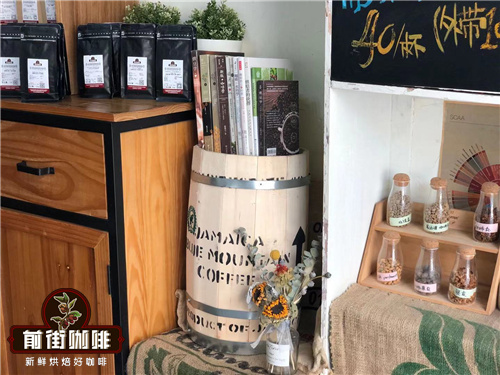
Professional coffee knowledge exchange more coffee bean information please follow the coffee workshop (Wechat official account cafe_style)
In recent years, individual coffee from Yunnan producing areas in China has begun to appear in the boutique coffee market and has been widely praised, which shows that the potential of Yunnan coffee will continue to be enlarged in the future. although the flavor of Yunnan coffee has not been fully established, Qianjie Coffee believes that Yunnan producing areas will also be able to produce coffee beans with their own flavor representatives. Therefore, Qianjie Coffee has also set up a manor specializing in growing tin card varieties of coffee trees in Baoshan, Yunnan Province, but the most widely planted in Yunnan is not iron pickup. Then the next article Qianjie Coffee will come to popularize the relevant knowledge about what coffee beans and coffee trees are grown in Yunnan several times a year.
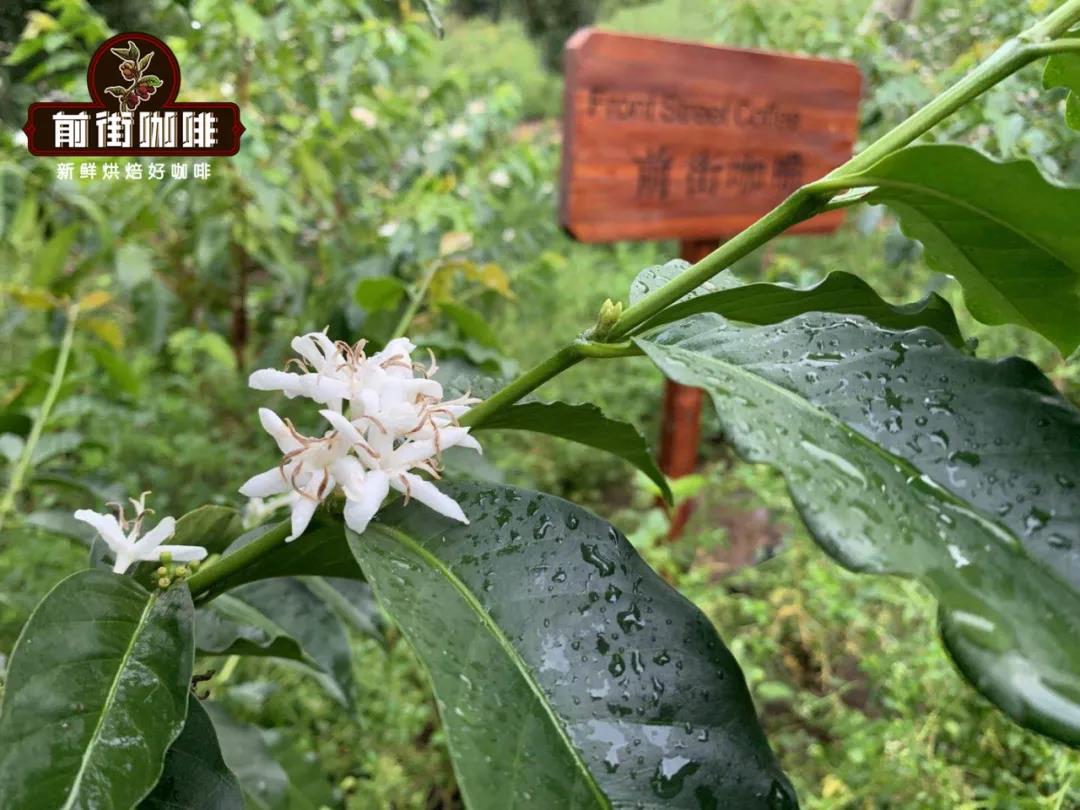
What varieties of coffee beans are mainly planted by coffee trees in Yunnan?
According to Qianjie Coffee, it is known that there are many main varieties cultivated in Yunnan at present, such as Katim, Tippika, Bourbon, Kaddura, Kaduai and other common varieties, but senior coffee lovers all know that the most common Yunnan coffee on the market is Katim varieties. For example, Yunnan small-grain coffee in the coffee market almost all refers to Yunnan Katim coffee beans.
This is because Yunnan Katim species at a high altitude of more than 1500 meters, can increase aroma and extract alcohol, coupled with appropriate post-processing, the color of the taste spectrum will not lose to the traditional old varieties, Yunnan coffee is not poor in this context, of course, this is not Qianjie coffee nonsense, but the United States CQI senior consultant Ted Lingle said.
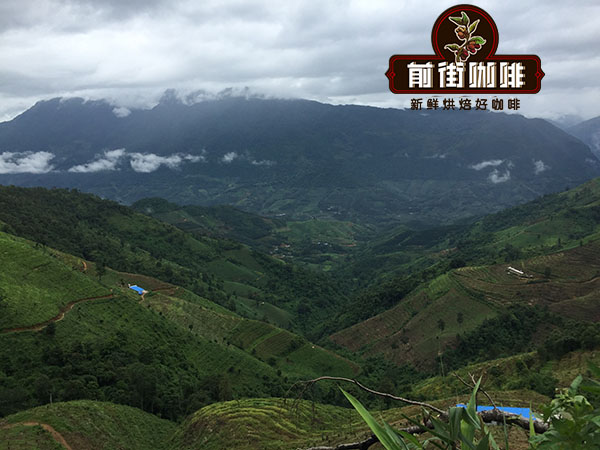
The reason why Qianjie coffee mainly grows tin card coffee beans is because iron pickup is always the oldest native variety of Arabica, and its flavor itself is slightly better than that of Katim. The original purpose of Qianjie coffee is to let coffee lovers taste the most primitive flavor of coffee beans, so there is no special treatment to process Yunnan coffee beans. Instead, the most traditional washing method is used to make Yunnan coffee beans cleaner and more prominent.
Yunnan small grain coffee variety-Katim
According to Qianjie Coffee, the origin of the Katim variety originated in 1959, when the Portuguese mixed Brazilian Kaddura and Timo to cultivate Katim with strong disease resistance, which is now an important variety of commercial beans.
Coffee is a short-day plant. Coffee has the characteristics of multiple flowering and concentrated florescence. The florescence of small seed coffee in Yunnan is from February to July, and the flowering period is from March to May. The flowering of coffee is greatly affected by climate, especially rainfall and temperature. Coffee flowers have a short life span of only 2-3 days. Small seed coffee usually opens at 3: 5 in the morning, and it takes a long time for the fruit to bloom from 5 to 7 in the morning. It takes 8 to 10 months for the fruit of small seed coffee to mature, usually from October to December of the year. Rainfall has a great influence on fruit development, and climatic conditions directly affect fruit. So normally a coffee tree only bears fruit once a year.
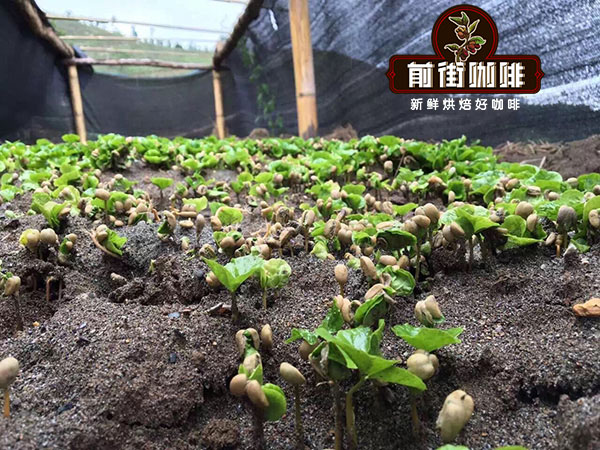
Iron pickup
As mentioned above in Qianjie Coffee, iron pickup is the oldest native variety of Arabica in the coffee market, and almost all the coffee beans that Arabica belongs to are derived from iron pickup. Iron pickup has an elegant flavor, but its physique is weak, its disease resistance is low, and it is easy to be infected with leaf rust. Therefore, the output of coffee beans is low, and there is no way to achieve economic benefits. In recent years, iron cards in Central and South America have been gradually replaced by Kaddura and Kaduai. So the figure of the iron pickup is becoming more and more rare. Although the flavor of the iron pickup is elegant, it is not as popular as bourbon.
Another reason why Qianjie Coffee grows the tin card variety of coffee tree is that it has a quiet and clean flavor, as well as a balanced feature, and a high degree of cleanliness, so it is the best choice to reflect the individual coffee beans grown in Yunnan.
In addition to coffee varieties and treatments, there are also planting conditions in producing areas that affect coffee flavor. after all, the climate of each city in the same province will be slightly different, and coffee is also a crop, so it will naturally be affected by climate, altitude and soil. then Qianjie Coffee will introduce several famous coffee producing areas in Yunnan.
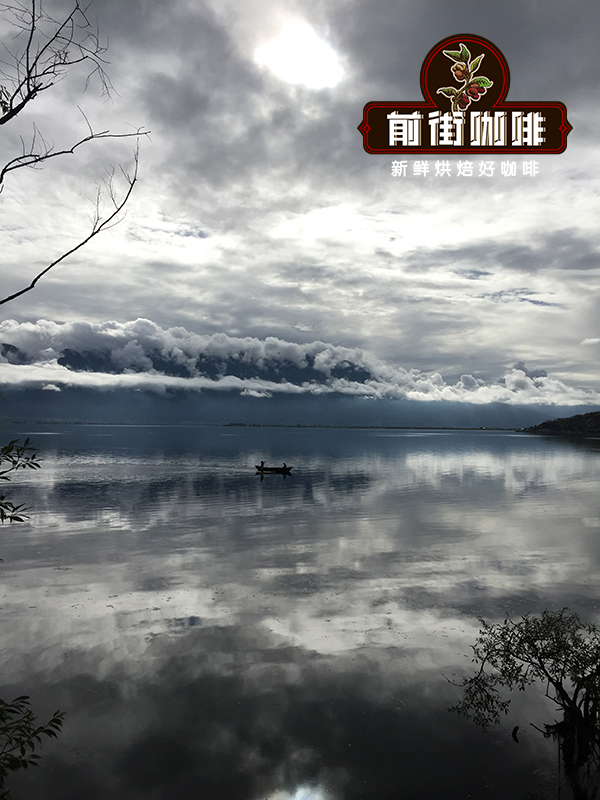
First of all, we should know that Yunnan is located in southwest China, and the Tropic of Cancer runs through southern Yunnan, which belongs to the mountainous plateau topography, in which the middle altitude area of 1000-3500m accounts for nearly 90% of the province's land area. Yunnan's climate belongs to the subtropical plateau monsoon type, with a large daily temperature difference and rich rainfall, just as Qianjie Coffee mentioned earlier that the coffee growing environment should be in high altitude areas. The temperature and precipitation must be suitable to grow high-quality coffee fruit.
So now the vast majority of individual coffee beans on the Chinese market come from Yunnan, which accounts for 98% of the national coffee market, which basically represents China's coffee industry.
At present, Yunnan coffee is grown in Pu'er, Xishuangbanna, Wenshan, Baoshan, Dehong and Lincang in the south and west of Yunnan.
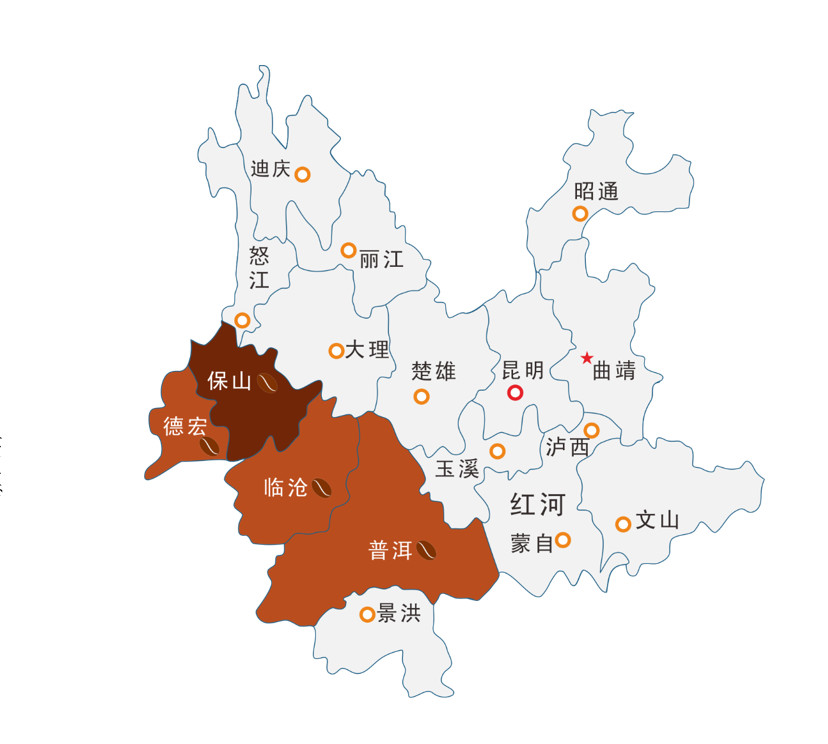
Dehong: it has the laudatory name of "hometown of Chinese coffee". The coffee planting in Dehong Prefecture is above 1000 meters above sea level, of which 30, 000 mu are planted in the mountains above 1600 meters above sea level. in addition, the coffee grown in Dehong Prefecture mainly uses organic fertilizers and organic pesticides, resulting in high quality coffee. it is one of the rare high-quality coffee producing areas in the world.
Baoshan: the cultivation of coffee in Baoshan began in the mid-1950s, and the first coffee seedling was introduced by the late patriotic overseas Chinese Mr. Liang Jinshan in Southeast Asia. In recent years, with the expansion of international trade, Lujiangba's small-grain coffee is more famous. Merchants in Europe, the United States, Egypt, Hong Kong and Macao, especially in Britain, the United States, Egypt, Hong Kong and Macao all regard it as top-grade coffee, and their products are in short supply. In December 2010, after being examined and approved by China's General Administration of quality Supervision, Inspection and Quarantine, it was decided to implement national geographical indication product protection for "Baoshan small Coffee".
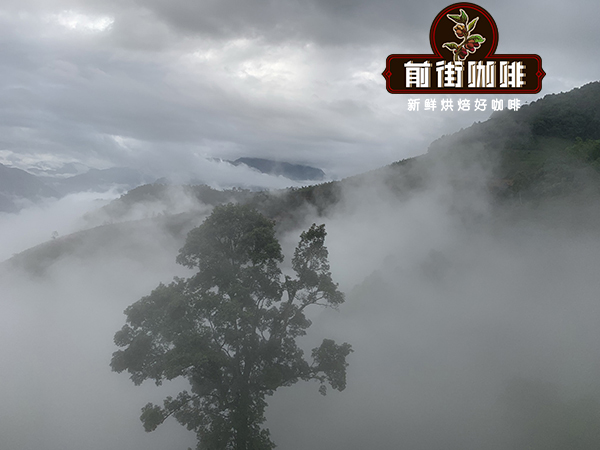
The reason why Qianjie Coffee chooses to grow coffee at the junction of Yunnan Baoshan and Myanmar is that the average temperature in Baoshan is 21.5℃, the highest is 40.4 ℃, and it is basically frost-free all the year round, so it is recognized as the best producer of small-grain coffee. The small-grain coffee cultivated here is famous at home and abroad for its strong but not bitter, fragrant but not strong, well-proportioned small noodles, mellow and fruity. Baoshan small-grain coffee in Yunnan has a long history of cultivation. Baoshan small-grain coffee can be said to be a national geographical indication product.
Lincang: because of its unique geographical location and climatic conditions, Lincang has become the focus of many coffee enterprises, and has successively established 200 mu and 100 mu of high-quality coffee breeding bases in Mengding Town and Lincang Happiness Farm in Gengma Autonomous County of the city. coffee is planted in Gengma, Zhenkang, Yun County, Cangyuan, Yongde and other places.
Pu'er: tea village Pu'er has cultivated coffee for 150 years. At the end of 1990s, Pu'er City began to cultivate coffee as a dominant backbone industry to adjust the industrial structure and increase farmers' income.
These are the different planting characteristics of Yunnan coffee producing areas. At present, Qianjie Coffee has also introduced several Yunnan coffee beans from a single producing area, each with its own unique flavor characteristics. Here is Qianjie Coffee to introduce to you.
Qianjie coffee Yunnan Huaguoshan coffee beans
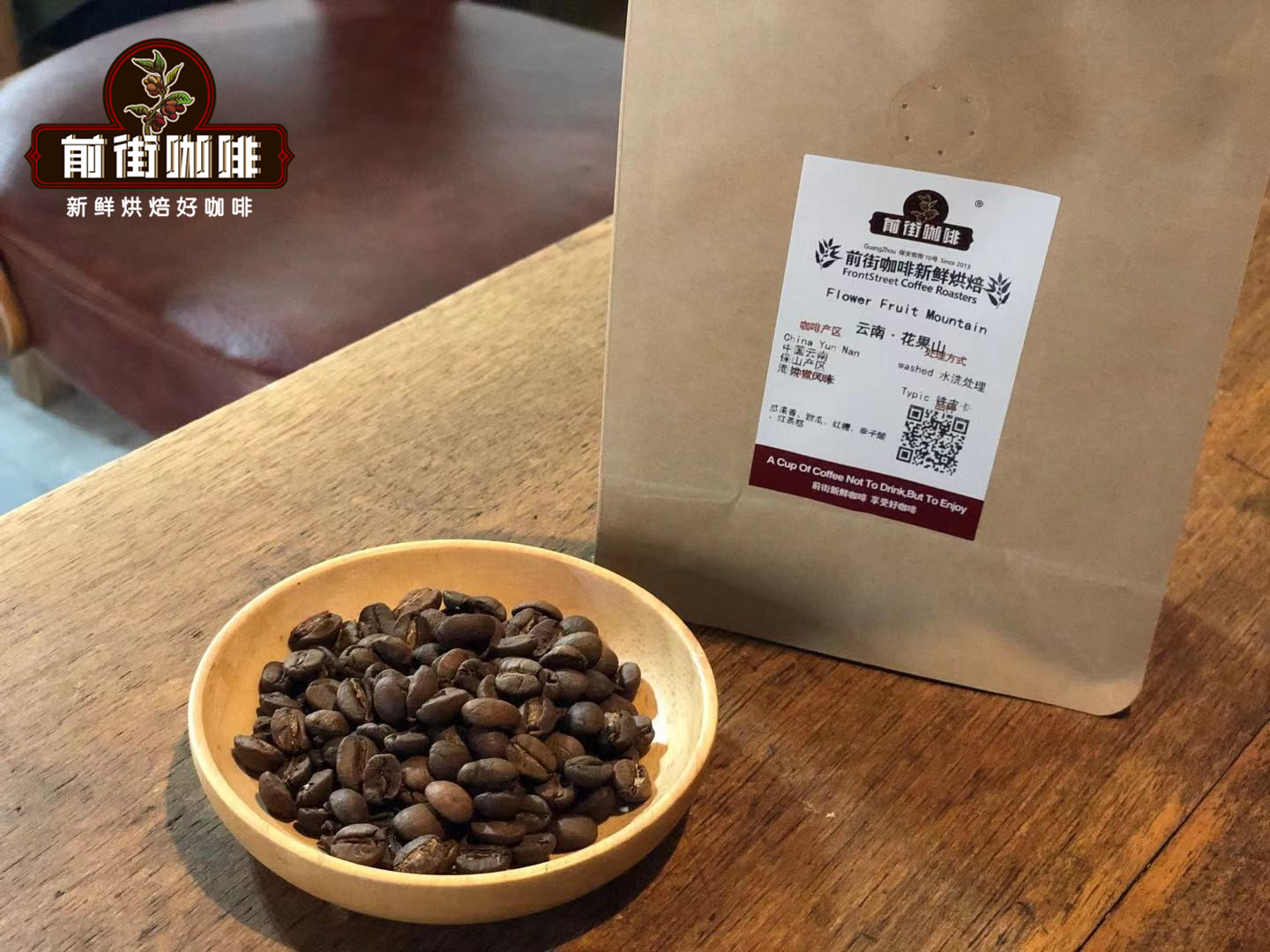
Country: China
Producing area: Baoshan, Yunnan
Altitude: 1450-1550m
Variety: iron pickup
Treatment: washing treatment
Flavor: citrus, nuts, plums, melon and fruit, brown sugar, black tea
Qianjie Coffee the difference between Yunnan Huaguoshan coffee beans and Yunnan Xiaoguo beans is that Huaguoshan is a variety of iron pickup, while Yunnan Xiaoguo is Katim, in fact, these two beans can be called small-grained coffee, but because the acid of Tippi card is softer and richer, it is specially chosen to distinguish the two varieties of beans in the name of Huaguoshan.
Qianjie Coffee Yunnan small Coffee beans (rations beans)
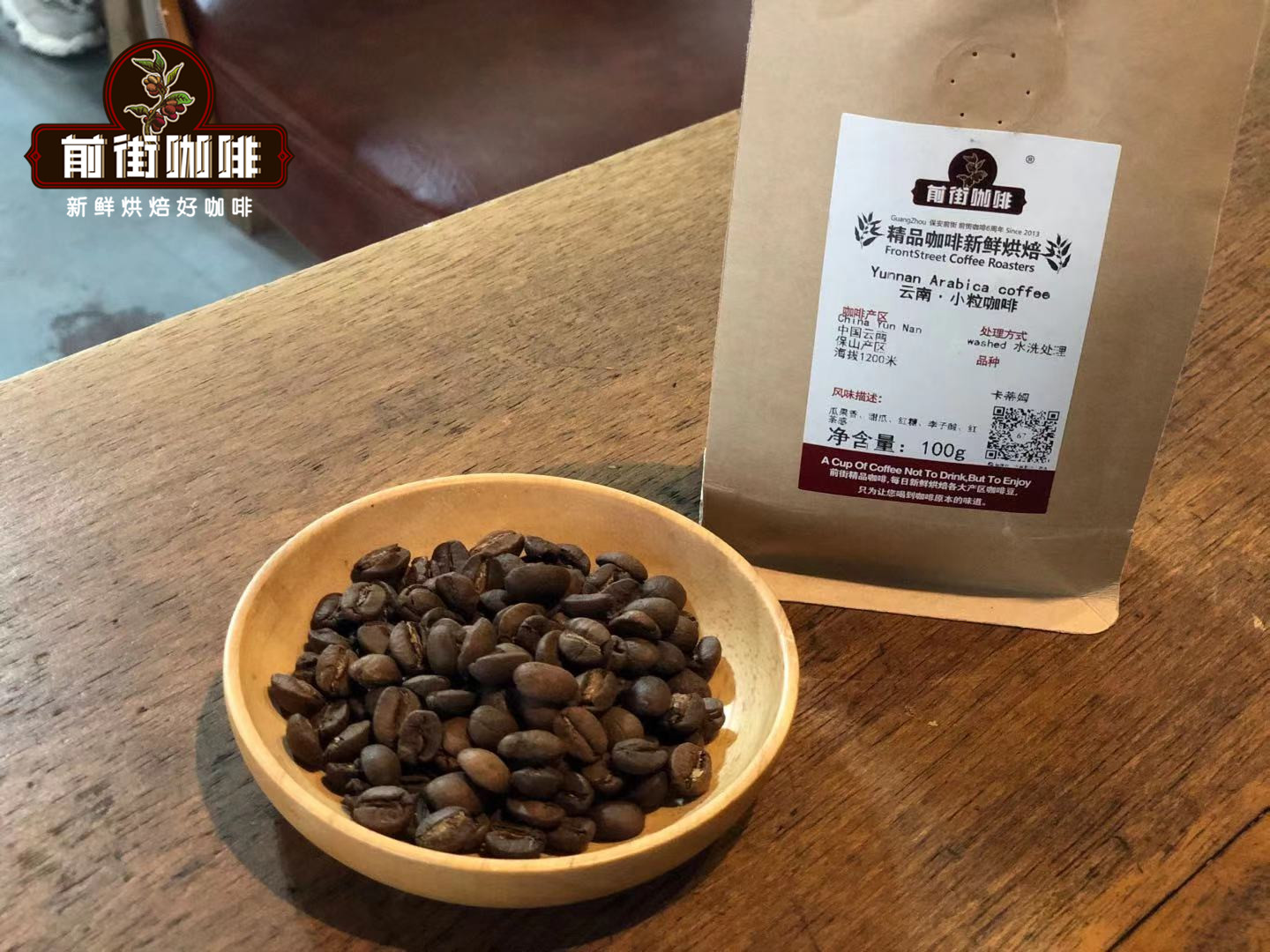
Country: China
Producing area: Baoshan, Yunnan
Altitude: 1200m
Variety: Katim
Treatment: washing treatment
Flavor: herbs, nutty, chocolate, caramel
Yunnan small-grain coffee refers to the small-grain coffee cultivated in Yunnan. Coffee is a small evergreen tree of Rubiaceae, native to Africa. At present, small-grain coffee and medium-grain coffee are mainly cultivated as beverage plants. The small-grain coffee cultivated in Yunnan, China traditionally refers to the mixed population of bourbon variety and iron pickup variety.
Small-grain coffee is the most widely cultivated species in the genus Coffee. Because of its strong cold resistance and short-term low temperature resistance, it can grow on mountains 2100 meters above sea level in tropical areas, but it is not resistant to drought; the branches are fragile and not resistant to strong wind; the disease resistance is weak; the fruit is easy to fall off after ripening; after processing, the coffee is mellow and contains low caffeine content.
Qianjie Coffee Yunnan Sun Katim Coffee beans
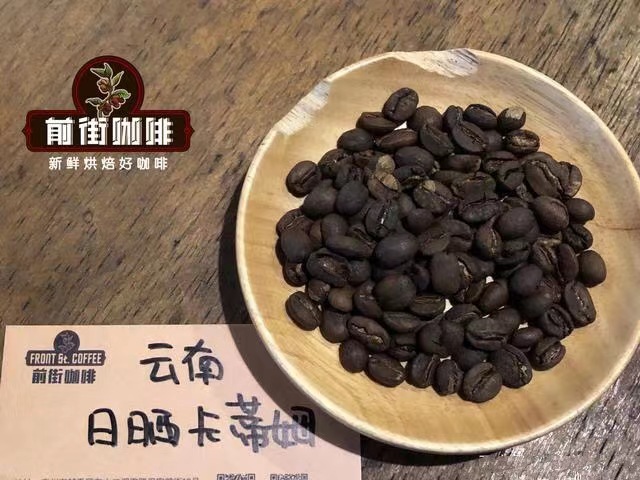
Country: China
Producing area: Yunnan (Baoshan)
Altitude: 1450-1550m
Variety: Katim
Treatment: red cherry sun treatment
Flavor: caramel, dried fruit, cocoa, dark chocolate, herbs, wood
At present, most of the plants in Yunnan are Katim, which is a hybrid of Kaddura and Robsta, a branch of the bourbon line in the Arabica species. The reason for planting this variety is that Katim has the Robusta gene, so it is better than a single old variety in disease resistance, and the yield is good. Compared with the delicate old variety, the disease resistance is poor and the yield is low. Farmers naturally prefer to plant Katim. So now there has been a Katim wind in Yunnan.
Yunnan coffee treatment method
As Qianjie Coffee said above, up to now, Yunnan coffee beans have used a lot of treatment methods, such as various anaerobic treatments, although these special treatments have also created a variety of highly identifiable unique flavors; but Qianjie Coffee believes that it insists on starting from the planting area and coffee varieties, and the change in treatment is only a temporary cure rather than a permanent cure, and Katim has always been Katim. Only from the source to choose the right coffee varieties with high altitude and flavor is sustainable for the long-term development of Yunnan coffee. Therefore, Qianjie coffee still insists on choosing the most primitive washing treatment and sun treatment to produce Yunnan coffee beans, so that coffee fans can drink the most primitive coffee flavor in Yunnan.
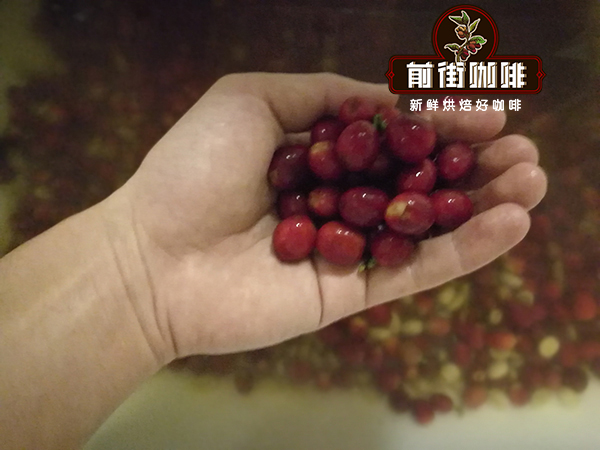
Sun treatment
Sun treatment is the oldest method of coffee bean treatment, also known as "natural drying method". Sun treatment does not require multi-high-end equipment, only a continuous sunny day to carry out the sun operation, in which exposure takes 27-30 days. Therefore, the requirements for climatic conditions are more stringent, suitable for countries in arid areas.
However, it is worth noting that although the sun treatment is relatively simple, it is also because the appearance of the sun-treated coffee beans is not good-looking, there will be some cracks, so it is not particularly popular.
Washing treatment method
Most of the coffee beans in different producing areas of Qianjie coffee are also washed, especially Qianjie coffee rations beans, because the washed coffee beans will be cleaner and the flavor will be more thorough, which is in line with the most primitive taste of coffee fruit. therefore, Qianjie often says that the flavor of washed coffee beans is a guide light to know the flavor of a producing area. This is why Qianjie Coffee insists on using water washing to produce coffee beans.
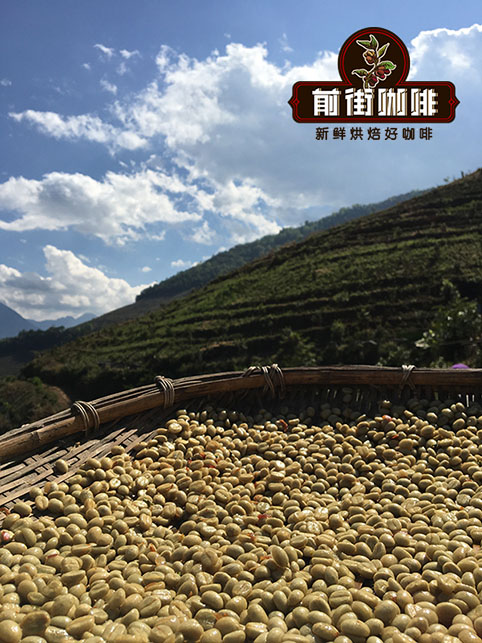
The difference between washing coffee beans and sun-treated coffee beans
The most essential difference between the sun treatment and the water washing treatment is that the sun treatment retains the flavor of the pulp, while the water washing removes the flavor of the pulp and represents the most essential flavor of coffee beans. Can feel the obvious difference in the taste, washing is cleaner and brighter, while the sun will be rich in taste. Qianjie coffee is precisely because the washing method can reflect the most essential flavor of coffee beans, so every time Yunnan coffee beans are recommended, if the guests taste Yunnan coffee beans for the first time, Qianjie coffee will give priority to recommend washed coffee beans, which can give people a clearer understanding of the flavor characteristics of Yunnan producing areas.
On the other hand, Qianjie coffee will be roasted and brewed before each new coffee bean is put on the shelf, so as to select the best flavor curve, which is convenient for coffee fans who come to Qianjie coffee to taste in the future. next, Qianjie coffee will share the roasting and brewing data of Qianjie coffee on the beans of Huaguo Mountain in Yunnan Province.
Suggestion on roasting coffee in Yunnan Huaguoshan, Qianjie
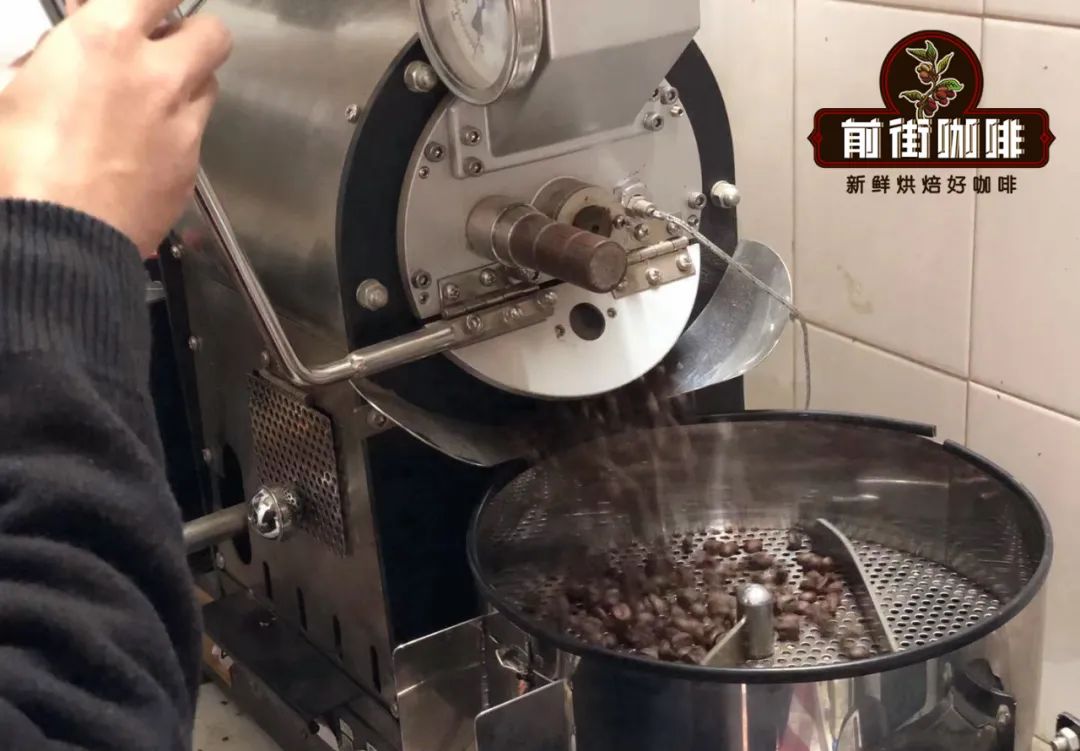
Generally speaking, coffee beans have a moisture content of 10.9%, so the Qianjie coffee roaster plans to put in the beans at 200 degrees in the roaster, then a big fire and a small throttle to speed up dehydration, and when the dehydration stage is over, open the stroke door and medium heat so that Maillard's reaction time is not too hasty, and the explosion will be released in 3 minutes. Temperature recovery point: 32,92.5 ℃, yellowing point: 5 minutes, 40 ℃, 148.5 ℃, explosion: 8 minutes, 59 seconds, 188.0 ℃, development 3 minutes: 12 minutes, 39 seconds, 196 ℃.
Qianjie Coffee Yunnan Huaguoshan Coffee Bean hand Chong suggestion
The V60 conical filter cup is recommended in the front street. V60 cup mouth is relatively large, coupled with its unique spiral curve ribs, so that the air can be discharged more easily to improve the extraction quality. The taste may not be thick enough, but its high concentration brings out the acidity and obvious aroma of Yunnan coffee is one of its major features.
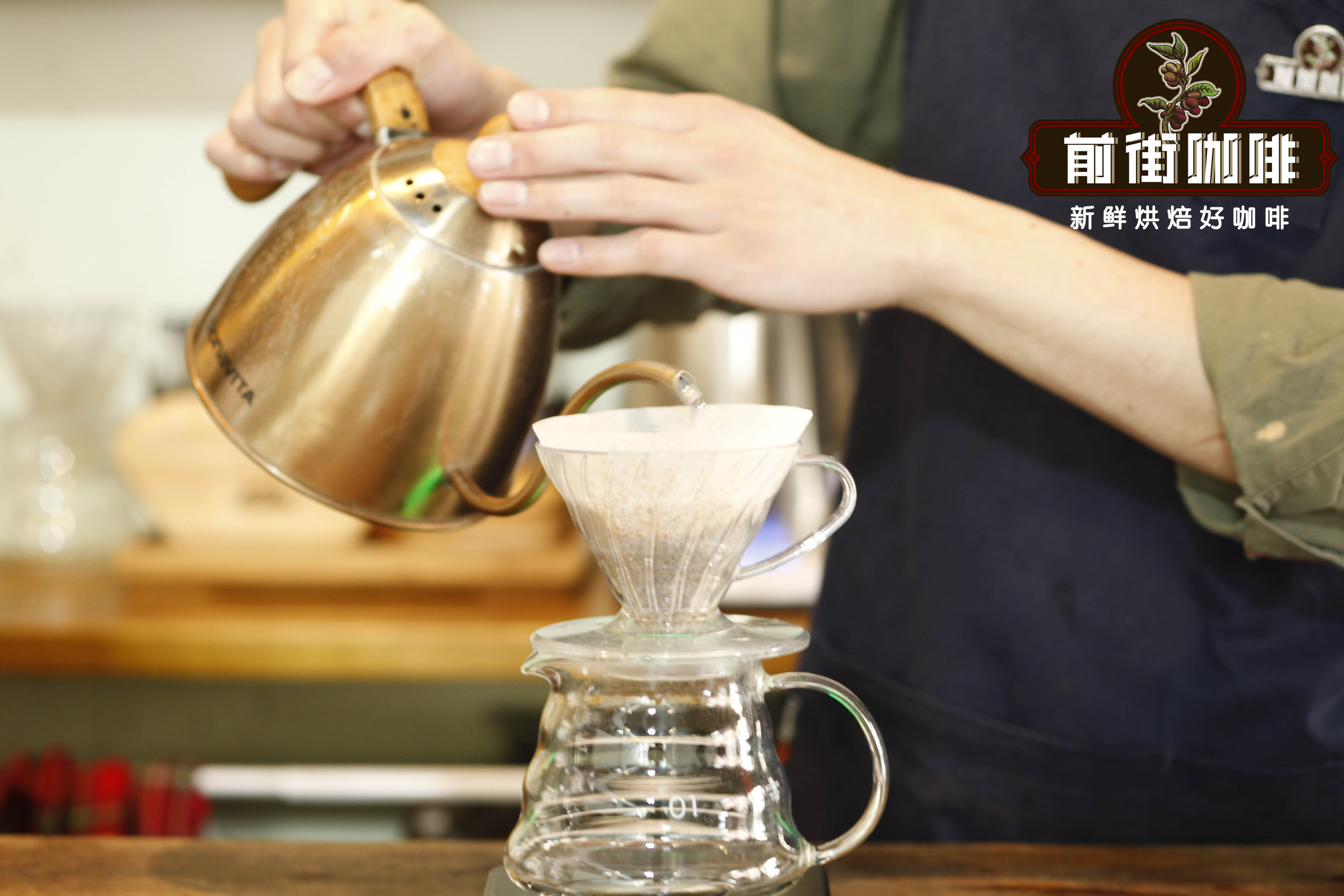
Filter cup: V60
Water temperature: 90-92 ℃
Powder / water ratio: 1:15
Degree of grinding: medium and fine grinding, that is, the thickness of fine sugar (VARIO 50: 57% pass rate of Chinese standard No. 20 screen)
Flushing and cooking technique: segmented extraction.
Steam with 30 grams of water for 30 seconds, small flow circle injection to 124 grams, continue to inject water to 227 grams when the water level is about to be exposed to the powder bed, remove the filter cup when the water level is about to expose the powder bed, and the extraction time is 2 minutes.
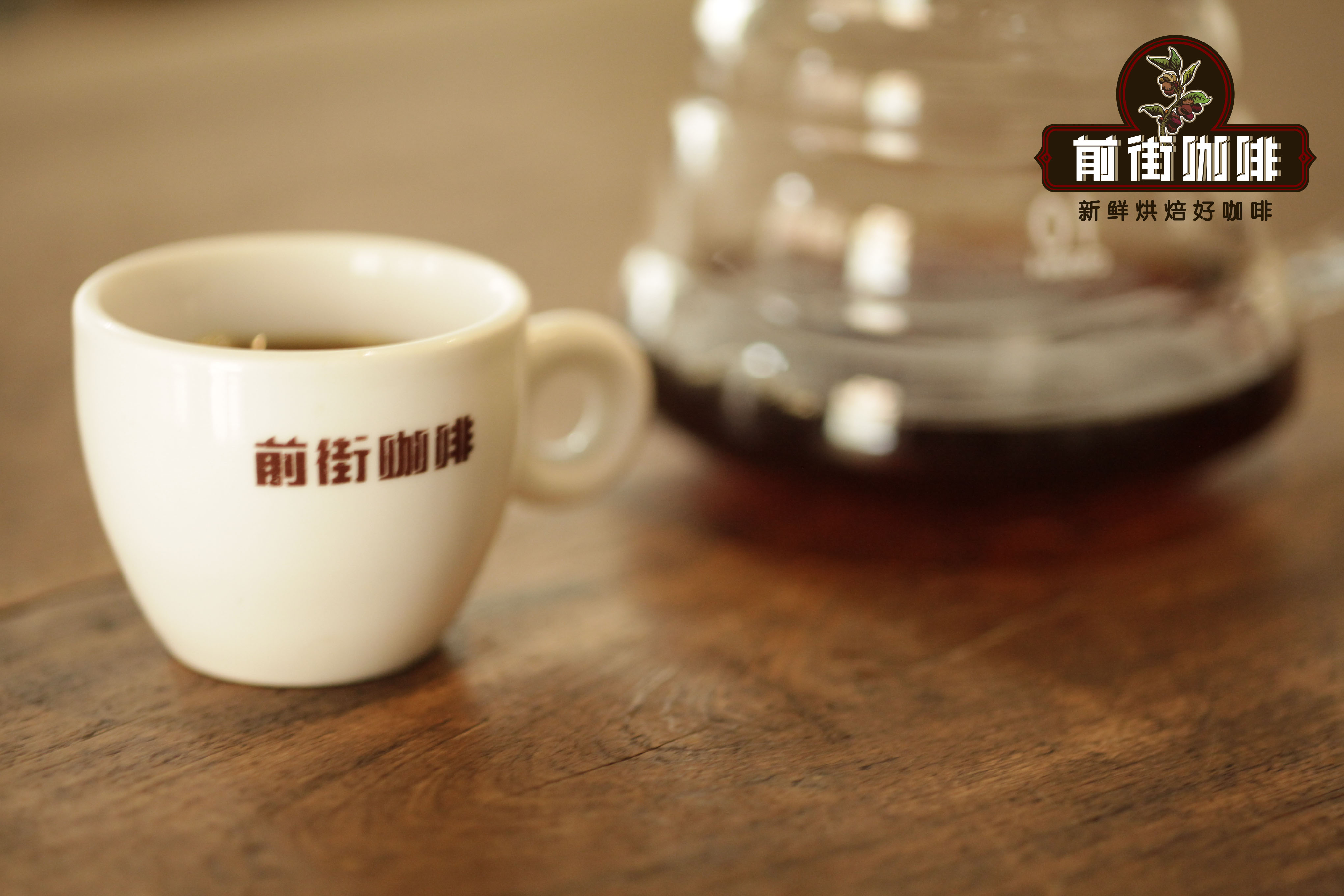
Huaguoshan cooking flavor description: strong but not bitter, fragrant but not strong, flower fragrance, sweet melon in the middle, black tea feeling at the end.
The above is the relevant knowledge about Yunnan coffee beans in a single producing area organized and shared by Qianjie Coffee, hoping to help coffee lovers learn more about Yunnan coffee.
For more boutique coffee beans, please add private Qianjie coffee on Wechat. WeChat account: kaixinguoguo0925
Important Notice :
前街咖啡 FrontStreet Coffee has moved to new addredd:
FrontStreet Coffee Address: 315,Donghua East Road,GuangZhou
Tel:020 38364473
- Prev

Espresso (Espresso) and espresso machine
I like the experience box column of the website very much, and I always want to share the content of coffee, but the more I know about coffee, the more I find that my level is not enough, so I dare not post it casually. Because it is found that the introduction of formal coffee information on the website is relatively few, some of the content comes from Baidu, so let's popularize the basic content. First of all, this article will introduce the Italian style.
- Next

American coffee to lose weight? which American coffee machine brand is better?
American coffee, as one of the mainstream coffee in the coffee industry, has been adhering to the taste of light coffee. American coffee was born after World War II, when American soldiers came to southern Europe. American coffee, a snack food, many beauty lovers have always been keen to lose weight, and some people will try to drink coffee to lose weight. Nowadays, people like to drink American coffee to lose weight, and many people will ask about American coffee.
Related
- Beginners will see the "Coffee pull flower" guide!
- What is the difference between ice blog purified milk and ordinary milk coffee?
- Why is the Philippines the largest producer of crops in Liberia?
- For coffee extraction, should the fine powder be retained?
- How does extracted espresso fill pressed powder? How much strength does it take to press the powder?
- How to make jasmine cold extract coffee? Is the jasmine + latte good?
- Will this little toy really make the coffee taste better? How does Lily Drip affect coffee extraction?
- Will the action of slapping the filter cup also affect coffee extraction?
- What's the difference between powder-to-water ratio and powder-to-liquid ratio?
- What is the Ethiopian local species? What does it have to do with Heirloom native species?

